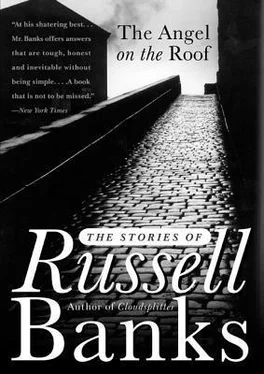I had never believed the entire story anyhow, but now I had certain proof that she had made up the whole of it. Just as the fact that I have never been interviewed by Dan Rather is proof that my mother, in her apartment in San Diego, never saw me on television being interviewed by Dan Rather. As for Grace Metalious’s characters from Peyton Place showing up at a Christmas party in my parents’ house in Barnstead, I never quite believed that one, either. Peyton Place was indeed based upon a true story about a young woman’s murder of her father in Gilmanton, New Hampshire, a village some twenty-five miles from Barnstead, but in the middle 1940s people did not drive twenty-five miles over snow-covered back roads on a winter night to go to a party given by strangers.
I said that to my mother. She had just finished telling me that someday, thanks to my experiences as a child and adult living in New Hampshire, Massachusetts, Florida, the Caribbean, and upstate New York, and my travels to South America, Europe, and Africa, I should be able to write another Peyton Place . This conversation took place some years ago, and I was visiting her in San Diego, an extension of a business trip to Los Angeles. I was seated rather uncomfortably in her one-room apartment. She is a tiny chickadee of a woman with few possessions, most of which seem miniaturized to fit her small body and the close confines of her lodgings, so that whenever I visit her I feel huge and oafish and lower my voice and move with great care.
She was ironing her sheets, while I sat on the unmade sofa bed, unmade because I had just turned the mattress for her, a chore she saved for when I or my younger brother, the only large-sized people in her life then, visited her from the East. “But we weren’t strangers to them,” my mother chirped. “Your father knew the Golden boy somehow. Probably one of his drinking friends,” she said. “Anyhow, that’s why, after the story came out in the newspapers about the murder and the incest and all, your father wouldn’t let me tell anyone.”
“ Incest? What incest?”
“You know, the father who got killed, he got killed and buried in the manure pile by his daughter because he’d been committing incest with her. Didn’t you read the book, Russell?”
“No.”
“Well, your father, he was afraid we’d get involved somehow, so I couldn’t tell anyone about it, not until after the book got famous as a novel. You know, whenever I tell people here in California that back in New Hampshire in the nineteen-forties I knew the girl who killed her father in Peyton Place , they’re amazed! Well, not exactly knew her, but you know…”
There’s always someone famous in her stories, said I to myself — Dan Rather, Sonny Tufts, Grace Metalious. She wants her stories, although false and about her, to seem true and about her listeners, and she’s figured out that having characters who are famous helps. When people think a story isn’t true, when they believe it’s only a fiction and not about them, they don’t listen to it, they interpret it — as I was doing that morning in my mother’s room, treating her story as a clue to her psychology, which would let me compare my own psychology and, noting the differences, sigh with relief. ( My stories don’t have famous people in them.) I had done the same thing with my father’s drunken fiddler, Uncle Russell. Once I learned that he didn’t exist and the story, therefore, was about my father and not me and, worse, was made up, I rejected it by using it as a clue to help me unravel the puzzle of my father’s dreadful psychology, hoping, no doubt, to unravel the puzzle of my own and safely distance it from his.
One of the most difficult things to say to another person is, I hope that you will love me for no good reason . But it is what we all want and rarely dare to say to one another — to our children, to our parents and mates, to our friends, and to strangers. Especially to strangers, who have neither good nor bad reasons to love us. And it’s why we tell each other stories that we pray will be transformed in the telling by that angel on the roof, made believable and about us all, no matter who we are to one another and who we are not. It’s certainly why my mother tells her stories to anyone who’ll listen, and why my father told me how I got my name. And though it’s too late for me now to give him what, one snowy Sunday morning long ago, he risked asking me for, by remembering his story and recounting it here, I have understood a little more usefully the telling of my own stories. And by remembering, as if writing my memoirs, what the stories of others have reminded me of, what they have literally brought to mind , I have learned how my own function in the world — regardless of whether I’m telling them to my mother, my wife, my children, my friends, or, especially, to strangers. And, to complete the circle, I have learned a little more usefully how to read and listen to the stories of others.
As I was leaving my mother that morning to drive back to Los Angeles and then fly home to New Hampshire, where my brother and sister and all my mother’s grandchildren were then living and where all but the last few years of my mother’s past had been lived, she told me a new story. We stood in the shade of clicking palm trees in the parking lot outside her glass-and-metal building for a few minutes, and she said to me in a concerned way, “You know that restaurant, the Pancake House, where you took me for breakfast this morning?”
I said yes and checked the time and flipped my suitcase into the backseat of the rented car.
“Well, I always eat breakfast there on Wednesdays, it’s on the way to where I baby-sit on Wednesdays, and this week something funny happened there. I sat alone way in the back, where they have that long, curving booth, and I didn’t notice until I was halfway through my breakfast that, at the far end of the booth, a man was sitting there. He was maybe your age, a youngish man, but dirty and shabby. Especially dirty, and so I just looked away and went on eating my eggs and toast.
“But then I noticed that he was looking at me, as if he knew me and didn’t quite dare talk to me. I smiled, because maybe I did know him, I know just about everybody in the neighborhood now. But he was a stranger. And dirty. And I could see that he had been drinking for days.
“So I smiled and said to him, ‘You want help, mister, don’t you?’ He needed a shave, and his clothes were filthy and all ripped, and his hair was a mess. His eyes, though, something pathetic about his eyes made me want to talk to him. But honestly, Russell, I couldn’t. I just couldn’t. He was so… I guess dirty and all.
“Anyhow, when I spoke to him, just that little bit, he sort of came out of his daze and sat up straight for a second, like he was afraid I was going to complain to the manager and have him thrown out of the restaurant. ‘What? What did you say to me?’ he asked. His voice was weak, but he was trying to make it sound strong, so it came out kind of loud and broken. ‘Nothing,’ I said, ‘nothing.’ And I turned away from him and quickly finished my breakfast and left the restaurant.
“That same afternoon, when I was walking home from my baby-sitting job, I went to the restaurant to see if he was there. But he wasn’t there. And the next morning, Thursday, I walked all the way over there to check again, even though I never eat breakfast at the Pancake House on Thursdays. But he was gone then, too. And yesterday, Friday, I went back a third time. But he was gone.” She lapsed into a thoughtful silence and looked at her hands.
“Was he there this morning?” I asked, thinking that a mild coincidence was perhaps the point of her story.
Читать дальше












